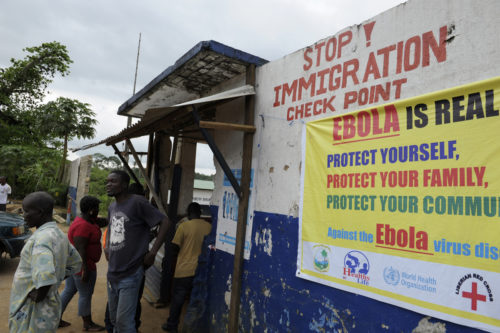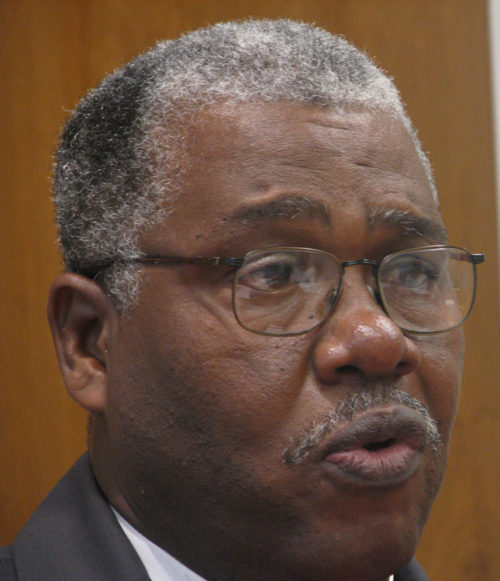Praying ‘that this Ebola passes over’ in LiberiaArchbishop details scene in Monrovia, explains church council statementPosted Aug 18, 2014 |
|

Liberian soldiers check people travelling in Bomi County Aug. 11. Liberian troops set up Ebola roadblocks and stopped public access to some of the worst-hit towns after the country declared a state of emergency to tackle the worst outbreak of the disease on record. Photo: Reuters
[Episcopal News Service] Liberian Archbishop Jonathan Bau-Bau Bonaparte Hart is praying to God “that this Ebola passes over” western Africa and his people are restored to health soon.
Hart, who spoke to Episcopal News Service Aug. 18 via telephone from his office in Monrovia’s Trinity Cathedral, spent the previous day visiting churches of all denominations in the capital city to urge people to practice the preventative measures being called for by medical and governmental workers and “to refrain from anything that will bring Ebola to us.”
Also on Aug. 18, Hart e-mailed ENS a two-page letter explaining that a widely reported recent statement by the Liberian Council of Churches about the need for prayer over the Ebola outbreak had been changed by an unknown person to include a reference to homosexuality and then released to the media. Hart is president of the council.
The Liberian Observer newspaper reported July 31 that the council had called for three days of national “indoor fasting and prayer” Aug. 6-8. The newspaper said that the first resolve of the resolution calling for the days of prayer read “that God is angry with Liberia, and that Ebola is a plague. Liberians have to pray and seek God’s forgiveness over the corruption and immoral acts (such as homosexualism, etc.) that continue to penetrate our society. As Christians, we must repent and seek God’s forgiveness.”
In his letter to ENS, Hart wrote that the call for prayer arose out of a council meeting in which the church leaders used Scripture to understand that they were “in the midst of a plague” and that, like the children of Israel, they and the nation were called to pray, fast and repent.
“As we talked about the state of our nation and how the most vulnerable of our society – women, children, the poor, the voiceless, continue to suffer the consequences of a post war nation that still lacks basic health care, education and economic empowerment, we, the leaders, felt that if God is angry at us, we must have done something against God’s will.”
Council members agreed that the nation needed to repent of its “shortcomings, including greed, corruption and the lack of stewardship for the care of our nation and its people.”
The discussion during the meeting included a conversation about human sexuality. The council is theologically diverse “and so we will interpret the teachings on human sexuality in more than one way,” Hart wrote.
“While we all agree with the protection of all people from acts of sexual violence, some of my colleagues believe that the sexual orientation of our gay and lesbian brothers and sisters is against God’s will,” he said in the letter.
However, there was no agreement to mention human sexuality in the church council statement, Hart wrote, and “neither I nor my colleagues who have a different view on human sexuality, approved the inclusion of the word ‘homosexuality’ as something for which the nation has to repent.”
“Someone chose to include that one word” to a statement that he thought all members had agreed on, Hart wrote.
The archbishop left immediately after the meeting to travel to the southeastern part of Liberia and, he wrote, without internet access he had “no way of knowing what the statement said” until he returned to Monrovia to calls from “very angry Liberian Episcopalians in Liberia and around the world.”
In the Aug. 18 letter Hart wrote that as president of the church council he should have “personally reviewed the final statement, edited it.”
“I profoundly regret that I did not,” he wrote.
Hart apologized to “anyone and everyone who was hurt by that statement” and wrote that he hopes the statement’s problems do not define his church’s “incredible witness” in Liberia.
Faithful witness in Liberia
That witness is anchored in faith. Liberians have always turned to their faith in troubled times, the archbishop wrote, “from the bloody military coup d’etat execution of certain government officials, who were some of our parishioners and relatives, to the 14 years of senseless and bloody civil war that saw the worst human behavior, and now this Ebola virus.”
Hart said that Ebola is a new and different war. “Unlike the war where we knew there were soldiers and rebels armed with weapons and deep hatred, this new war is silent, invisible, but just as devastating.”
Health workers in the Liberian capital of Monrovia are being overwhelmed in their efforts to collect and properly dispose of the bodies of those who have died from Ebola, Hart told ENS.
Sometimes people run out of patience to wait and so “sometimes they go on a rampage to attract police,” he said.
Weekend violence at a clinic for testing and monitoring people who had been exposed to Ebola occurred, according to what Hart had learned, because residents of the surrounding community thought that the patients did in fact have Ebola. They attacked the clinic “and made away with some of the health center’s materials,” he said.
News accounts of the attack in what Hart called “one of the worst slum areas” of Monrovia reported that bloody sheets and mattresses were also taken and that 17 people being kept at the clinic had disappeared.
According to Hart, people also are struggling with the conflicting desires to care for their sick family members and prepare the bodies of those who have died with the necessity of not coming in contact with the bodily fluids through which Ebola, a hemorrhagic virus, spreads.
He said he and others in the churches and in government are urging people to set up hand-washing stations and to wash their hands frequently in chlorine-treated water.
In addition, there are people who “still do not believe what is happening is Ebola – who still do not believe that there is Ebola in our country,” Hart said.
Ebola deaths increasing throughout West Africa
The current Ebola outbreak began in Guinea in December 2013 and now involves Guinea, Liberia, Nigeria and Sierra Leone, according to the United Nations’ World Health Organization.
On Aug. 15, WHO said that between Aug. 12-13, a total of 152 new cases of Ebola virus disease (laboratory-confirmed, probable and suspect cases) as well as 76 deaths were reported from Guinea, Liberia, Nigeria and Sierra Leone. Since the outbreak began, there have been 2,127 laboratory-confirmed, probable and suspect cases and 1,145 laboratory-confirmed, probable, and suspect deaths, the organization said.
“The scale, duration, and lethality of the Ebola outbreak have generated a high level of public fear and anxiety, which extends well beyond west Africa,” another press release from WHO said. “Such reactions are understandable, given the high fatality rate and the absence of a vaccine or cure.”
The organization acknowledged that people are looking everywhere for cures and that some are placing their hopes in dangerous products and practices. “All rumors of any other effective products or practices are false,” WHO said in the release. “Their use can be dangerous. In Nigeria, for example, at least two people have died after drinking salt water, rumored to be protective.”
“The most effective personal behaviors are avoiding well-known high-risk situations, knowing the symptoms of infection, and reporting early for testing and care. Evidence suggests that early supportive care improves the prospects of survival,” the statement said.
The organization also cautioned people against hoping for the widespread effectiveness of experimental drugs to treat Ebola, which it authorized last week, because of safety concerns, difficulty in administration in such settings and the limited supply of the drugs.
WHO has called the outbreak “the largest, most severe and most complex” since the disease was first seen in Zaire, now the Democratic Republic of Congo, in 1976. The disease killed 280 during that outbreak, according to the United States Centers for Disease Control and Prevention.
— The Rev. Mary Frances Schjonberg is an editor/reporter for the Episcopal News Service.


Social Menu